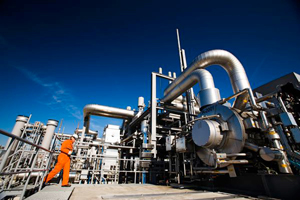Dutch energy companies show the way to a low-carbon future
on
"Netherlands needs to step up its efforts on all fronts"
Dutch energy companies show the way to a low-carbon future
It is "technically possible" to achieve a 40% CO2 emission reduction in the Netherlands in 2030 compared to 1990. A "least-cost" approach to realise this would lead to a "total additional cumulative cost to society" of between €20 and €50 billion. This translates into a cost of €100 to €300 per household per year.These are the main conclusions of a study carried out by Energy Forum NL, a group of seven energy companies active in the Netherlands (Dong Energy, EBN, Eneco, Gasterra, Gasunie, GDF Suez and Shell).
 |
| Installations at Slochteren, the Dutch largest natural gas field |
The report ("Energy in the Netherlands - Optimized Pathways to CO2 reduction in the Dutch Context"), which came out on 25 January, has not received much publicity in the Netherlands. According to Frank van Oordt of Shell, speaking on behalf of the Forum,they deliberately kept a low profile with the study. “It’s a rather complex report with lots of calculations and assumptions”, he says. “It is not easy to explain to a broad audience.” The Forum will distribute the report among a select group of policymakers and opinion leaders.
Energy Forum NL, an ad hoc consortium, has its roots in the European Gas Advocacy Forum, says Van Oordt. This “group of experienced gas players in Europe”, as it describes itself (including Statoil, Centrica, ENI, Eon Ruhrgas, Gazprom, GDF Suez, Qatar Petroleum and Shell), published a comparable, European-wide report in December 2010 ("Making the Green Journey Work - Optimised pathways to reach 2050 abatement targets with lower costs and improved feasibility"). This concluded that “gas is key for Europe to reach climate targets at the lowest costs”. The data for this report were supplied by McKinsey. The Netherlands-based companies decided to ask McKinsey to do a similar exercise for the Dutch market, resulting in the current report “Energy in the Netherlands”.
Well-positioned
It will probably not come as a surprise to most readers that the Dutch study similarly concludes that “gas will continue to play an indispensable role in all abatement options”. But the report does not focus predominantly on gas. In fact, it urges the Dutch government to develop a wide range of low-carbon options, including biomass, offshore wind, onshore wind, decentralized heat and cold storage, carbon capture and storage (CCS), hydrogen, electric cars and gas-base decentralized power generations.
The good news, says the report, is that “from a European perspective, the Netherlands is well positioned to lead abatement in several areas, due to geological and infrastructural advantages”. For example, the country has plenty of depleted gas fields that can be used for CCS, deep-sea harbors that are able to handle the import of large amounts of biomass, a high population density that is well-suited for the implementation of district heating and electric transport, and good onshore and offshore wind conditions.
The bad news is that, as the report puts it, “a significant acceleration of the current build-out of renewables may be needed if the Netherlands is to meet its 2020 target”. Or, as Van Oordt puts it, “there is still a long way to go” for the Netherlands if it wants to meet the decarbonisation goals it has agreed on within the EU. And this applies to all “abatements options” that are available.
Put differently, the implicit message from the Forum to the Dutch government is that it needs to step up its efforts on all fronts if it wants to be serious about the transition to a low-carbon energy supply. It is no
| The bad news is that "a significant acceleration of the current build-out of renewables may be needed if the Netherlands is to meet its 2020 target" |
Policy framework
The report of Energy Forum NL pays considerable attention to the costs of the transition to a low-carbon future. It estimates that in the power sector “abatement costs” (on top of a business-as-usual scenario) will run to about €150 mln a year (€20 per household) for the period 2010-2030. However, this assumes a CO2-price of between €15 per ton in 2010 to €44 per ton in 2020. If these CO2-costs are included, costs would roughly double.
For the non-power sector, abatement costs are estimated at around €350 mln a year (or €810 mln a year if CO2-costs are included).
It should be noted, though, that these are the costs that come with the “least-cost scenario” that is described in the report. It is by no means certain that this scenario will be followed. For example, the scenario assumes that a new (second) nuclear power station will be built in the Netherlands in the coming years, but the most likely candidate to undertake such a project, energy company Delta (owner of the only existing Dutch nuclear plant in Borssele) has recently shelved plans for a second nuclear power plant.
And there is another, broader problem. The report emphasizes that, “given the long-term capital-intensive nature of many energy investments, a stable, long-term policy framework for investments and planning (both in Europe and the Netherlands) will be indispensable to achieve the target abatement across all sectors”. This includes “a strong, functioning Emission Trading Scheme (ETS)”. Although the report does not say so explicitly, it is clear that this is currently not the case. “Dutch policy has not been model of a stability”, says Van Oordt. “And the ETS is not yet functioning well.”


Discussion (0 comments)